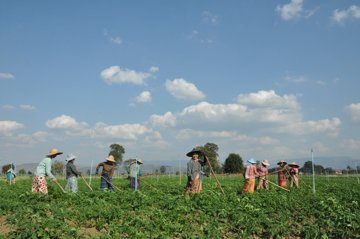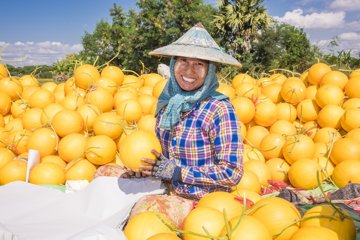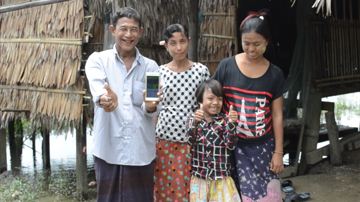‘Since G4AW, digitalisation has become an integral part of development cooperation’
The Netherlands invested for ten years in the Geodata for Agriculture and Water (G4AW) programme. In this series, key players look back and reflect on the future. According to Hugo Verkuijl and Bart Veenstra from the Ministry of Foreign Affairs, G4AW was an innovative programme that still influences their ministry's digitalisation policy.
The Ministry of Foreign Affairs financed the G4AW programme starting in 2013. What did your ministry aim to achieve with this programme, and to what extent was it successful?
Verkuijl: ‘Certainly. I immediately think of inclusive financing. The satellite data and digital applications we aimed to use for food security also turned out to play a role in microcredit and insurance. Access to microcredit is essential for small-scale food producers to invest in improving productivity. However, microcredit providers want to know the likelihood that a small-scale food producer can repay the loan. You can partly predict this based on digital information. The same goes for insurance. Based on satellite data, you can develop digital insurance products that help insure risks for small-scale food producers.’

© Ruud Grim, NSO
How do you reflect on the role of the NSO in the G4AW programme, and what role do you see for the NSO in the future?
Verkuijl: ‘NSO has been a driver of innovation. I was living in Mali when the GARBAL project was implemented for livestock farmers there. Using satellite data, they could locate food-rich areas for their cattle to graze. That is a perfect example of a digital service serving an entire sector. There were 25 projects and partnerships that all began with NSO's help. In hindsight, you can say that the applications developed mainly originated from supply and were based on a private revenue model: farmers had to pay for the applications. This proved difficult, as many farmers were unwilling to do so. The challenge for NSO is to work more demand-driven with other organisations and focus on decentralised financing, for instance, through organisations like the World Bank and IFAD. Local governments must also play a more significant role to ensure applications benefit an entire sector rather than just a few farmers.’
Bart Veenstra, how has G4AW influenced the digitalisation policy of the Ministry of Foreign Affairs?
Veenstra: ‘When G4AW started, digitalisation barely existed in development cooperation. I think the programme was ahead of its time. That’s a compliment to its creators. The lessons we learned from G4AW have found their way into the core policy of the Ministry of Foreign Affairs. Digitalisation is now indispensable from the Netherlands' development agenda. Incidentally, we are not alone in this. Similar insights have been gained around us, particularly in Europe and by the United Nations.’

© G4AW Myvas4Agri project
How do you view the relationship between development cooperation and the new Long-term Space Agenda of the Dutch government?
Veenstra: ‘The Long-term Space Agenda shows that you can use digitalisation—and space applications, in particular—as a kind of lever to positively impact the living conditions of people worldwide. Conditions in the areas of food security, but also health, education, and finance. First, you need a good digital infrastructure and free access to information. But you also need an ecosystem where innovations can occur. The Netherlands has such an ecosystem and is part of European cooperation in space. It's important that we think carefully about what we can offer the world, but equally important to consider the context of developing countries. What do they need? What questions are at play in that country? From these questions, you can drive innovation.’
Why is it important to continue considering digitalisation—and more specifically, Earth observation—as an enabling technology within the context of development cooperation in the future?
Veenstra: ‘Asking the question is answering it. Now replace “within the context of development cooperation” with: “the Netherlands.” Why is it important to develop Earth observation applications for the Netherlands? Everyone would say: that’s obvious, right? For us, digitalisation is a given. We identify with DigiD (a Dutch national app for authentication), we communicate with the hospital digitally, we check which train to catch—all on our smartphones. Why should this be different in developing countries? The demand is just as great there, if not greater, precisely because these countries are still developing. Often, there is a less strong central government setting up various digital services. People are therefore dependent on what is created by other parties. Think about what access to financial markets or digital education could mean for the future of a smallholder farmer in Burkina Faso and his family. That is why digitalisation must always be included in development cooperation.’
What role do you see for the NSO in this regard?
Veenstra: ‘To be successful, you must collaborate with end users in developing countries. This is where NSO has a crucial role. Perhaps not as a party that will organise everything itself, but as the knowledge broker enabling companies, NGOs, and other organisations to make Dutch knowledge and technology available.’
What role will digitalisation and space applications play in the world of development cooperation and partnerships in ten years?
Veenstra: ‘The world is changing fast. That makes it difficult to predict the future. What we do know for sure is that digital services will play an increasingly significant role. Several international organisations have pointed out that there is a digital divide between people with access to and knowledge of digital tools and those without. Almost every development policy mentions that we must reduce this digital divide. The Netherlands, together with Europe, stands for fair, transparent, and secure access to digital tools for everyone. A key part of this is satellite data and satellite services, as demonstrated by the G4AW programme. I cannot pre-empt the new government’s policies, but whatever we do, digitalisation will play a crucial role.’

© G4AW SAM project